How to take part in NHS Change Consultation to help save babies’ lives and improve care
The Government has recently published a public consultation on the future of the NHS. Any member of the public can take part and contribute their views on how the NHS needs to change over the next 10 years.
This is an important opportunity to make saving babies’ lives and improving care for bereaved families a priority with the new Government.
We’ve created this step-by-step guide to help you take part in the consultation.
There are a few different ways you can take part, depending on how much time you have.
We’ll also provide you with a few suggested things to say if that's easier for you.
This consultation is for the NHS in England only and will most likely be open until early 2025. But with no specific closing date, we would recommend getting your responses in now to help influence change.
If you need any support taking the consultation, or if you have any questions, please don’t hesitate to contact us at campaigns@sands.org.uk.
How you can get involved
There are 3 different ways you can take part in the consultation, depending on how much time you have:
-
If you have 5 minutes: suggest an idea to change the NHS for the better.
-
If you have 15 minutes: share your experience of the NHS.
-
If you have 30 minutes: take the survey on the consultation website.
Here's our step-by-step guide on how to take each of these actions below. You can of course do all three if you have the time.
It may be a good idea to open the consultation in a new tab or window, while keeping this webpage open. That way you can switch between the consultation and this guide, using it to help you take part.
The main points we want to get across
These are the three things we want to get across to the Government in our responses to the consultation.
- Maternity care must be made a priority so all families can access safe, high-quality care.
-
We need a new national ambition to reduce the rates of baby death including a specific target to reduce inequalities.
- Every bereaved parent must get the care they need when a baby does die.
If you have 5 minutes: suggest an idea
One of the quickest ways you can get involved in the consultation is by suggesting your own ideas to improve the NHS.
Please note, since members of the public can suggest any ideas they like, there is a chance you could see offensive material – although the website should be moderated.
Submit ideas to save babies’ lives and improve care
We know that the Government will look at all the ideas that people submit, so it will make a difference to give as many suggestions as possible. We’ve suggested some ideas below that you could copy and paste.
You could also search through the other ideas people have made to ‘like’ and ‘comment’ on any that are related to saving babies lives, maternity and bereavement care, or similar topics.
You can click ‘submit an idea’ to write your own suggestion. Once you click on this button, you will first be prompted to make an account. It’s a quick process, and only requires a couple of pieces of information.
You’ll then be taken to a page where you’ll need to provide a few details about your idea to change the NHS. Below are a few suggestions for ideas you could submit.
Make maternity care a priority
All families must be able to access safe, high-quality maternity and neonatal care.
There have been a succession of scandals and inquiries into maternity services across the country in recent years. This can’t keep happening.
We need systemic change to fundamentally improve maternity and neonatal services and save more babies’ lives.
Renew the national ambition to save babies lives
England has not made enough progress on saving babies’ lives.
The current ambitions to save more babies’ lives expire in 2025, and we are not on track to meet it.
The Government and the NHS must set new targets to reduce baby deaths, including specific ambitions to eliminate inequalities in baby loss.
Tackle inequalities in baby loss
There are stark and persistent inequalities in pregnancy and baby loss by ethnicity and deprivation.
Sands has calculated that if between 2017 and 2021, stillbirth and neonatal death rates were the same for Black and Asian babies as white babies, 1,704 babies would have survived. This is unacceptable. No baby should have an increased risk of dying because of their ethnicity or where they’re from. The new 10-year plan for the NHS must include action to eliminate these inequalities with specific targets.
Improve mental health support for bereaved parents
Too many bereaved parents are struggling to access the mental health support they deserve.
When a baby does die, bereaved parents and families should be able to access mental health support when they need it most. Whilst we know there has been some progress with the introduction of maternal mental health services, these do not go far enough.
Many parents still experience long waiting times to receive support, and we know there are many areas where there is limited or no support for bereaved partners and fathers. This is not good enough.
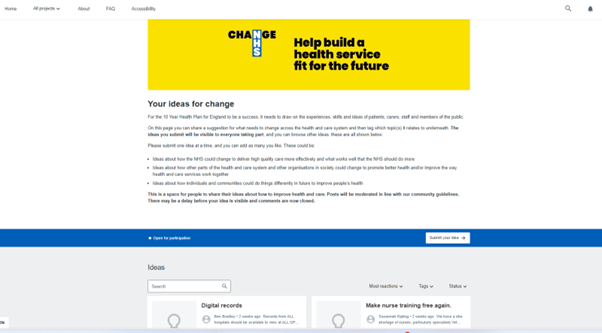
If you have 15 minutes: share your experiences
There is also a page on the consultation website where you can share your views and experiences in an open text box. This could be a good way to share your story in more detail.
As with the ideas page, you’ll need to quickly make an account if you haven’t already.
What to say
Once you're on the page, you could use the box to tell the Government all about your experiences of maternity, neonatal, or bereavement care. Here are some questions that might help you write your answer:
- What happened during your care?
- Were there any positive elements of your care?
- What could have gone differently or been improved?
- How should the NHS learn from your experiences to improve?
Afterwards, you could talk about why your experience means the Government should make saving babies’ lives and improving bereavement care a priority. Feel free to use some of the suggested bullet points below:
- Pregnancy loss and the death of a baby have a devastating impact. The Government and NHS must make it a top priority.
- We can’t go on hearing about the same failings time after time. There needs to be proper systemic change to improve maternity and neonatal services.
- The NHS is still not learning lessons when babies die. This needs to change so we can save more babies’ lives in the future.
- There are stark inequalities in pregnancy and baby loss by ethnicity and deprivation. The NHS plan must focus on addressing this.
- There are currently too many gaps in the support available following the loss of a baby, including a lack of mental health support.
- The Government must renew the national maternity safety ambitions to 2035 and extend them to include a target to reduce inequalities.
There is no pressure to share any details of your experiences that you do not wish to share, or that you are uncomfortable sharing.
Sands is here for you if you need support. Click here to go to our support webpage, or you can call our helpline on 0808 164 3332.
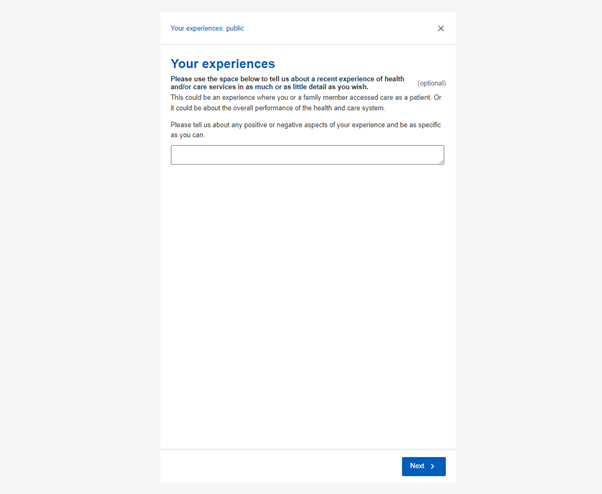
If you have 30 minutes: answer the survey
The final way to get involved in the consultation is to answer the Government’s survey of specific questions on changing the NHS. We’ll take you through how to answer each question in our tips below.
You’ll need to quickly make an account if you haven’t done so already.
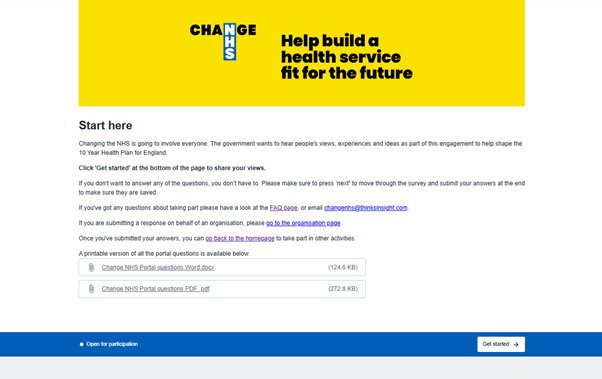
Step one: best things about the NHS
In this section, you are asked to put the 3 best things about the NHS today. You’ll have a chance to provide more critical feedback in the next questions.
For this section, you could put any positive experiences you had during your care. For example if:
- Your bereavement care was good.
- Staff were supportive and helpful.
- You received appointments quickly.
You could also mention anything else you like about the NHS in general.
This section is optional, so just click ‘next’ if you don’t want to answer it.
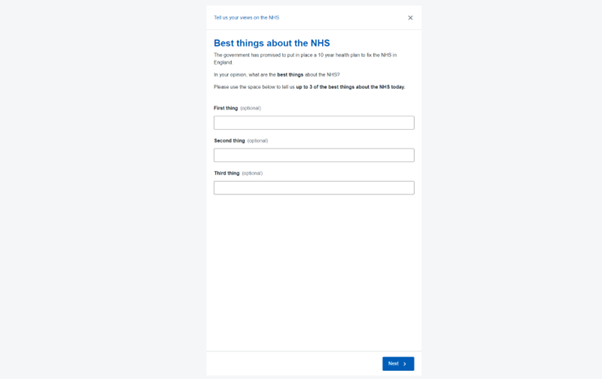
Step two: challenges facing the NHS
The next question asks you about the biggest problems facing the NHS.
From our research, we know that the Government is not on track to hit our targets to save more babies’ lives, and there are persistent inequalities in baby deaths. Tragic safety scandals in maternity units keep happening, and bereaved parents consistently struggle to access mental health support.
This question is an important opportunity to talk about some of these big issues.
We’ve put some suggested bullet points below which you could use:
- England has not made enough progress on saving babies’ lives. The current targets to save more babies lives’ expire in 2025, and we are not on track to meet them. Pregnancy loss and the death of a baby have a devastating impact. The Sands and Tommy’s Joint Policy Unit has calculated that since 2018, around 1,000 lives a year could have been saved if ambitions were met. The Government and NHS must make it a top priority. The Government and the NHS must set new targets to reduce the number of babies dying, and introduce a comprehensive, cross-government programme of work to achieve them.
- There are stark inequalities in pregnancy and baby loss by ethnicity and deprivation. Sands has calculated that if between 2017 and 2021, stillbirth and neonatal death rates were the same for Black and Asian babies as white babies, 1,704 babies would have survived. This is unacceptable. No baby should have an increased risk of dying because of their ethnicity or where they are from. The new 10-year plan must include action to eliminate these inequalities.
- Maternity care must be made a priority. All families should be able to access safe, high-quality care. There have been a succession of scandals and inquiries into maternity services across the country in recent years. This can’t keep happening. We need systemic change to fundamentally improve maternity and neonatal services and save more babies’ lives.
-
Too many bereaved parents are struggling to access the mental health support they deserve. When a baby does die, bereaved parents and families should be able to access mental health support when they need it. Whilst we know there has been some progress with the introduction of maternal mental health services, these do not go far enough. Many parents still experience long waiting times to receive support, and we know there are many areas where there is limited or no support for bereaved partners and fathers. This is not good enough.
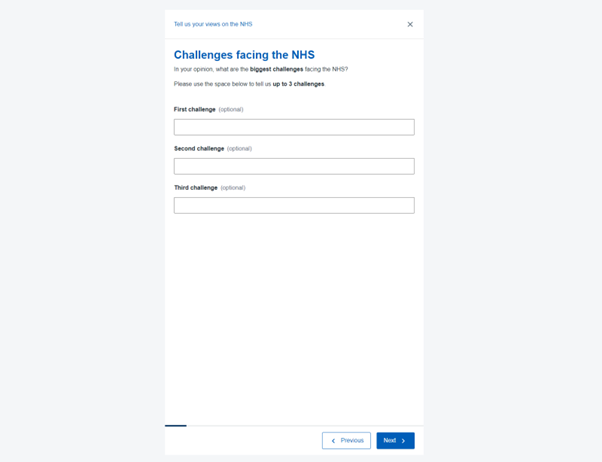
Step three: The Darzi Report
The next section focuses on the findings of the Darzi Report – an independent investigation into the NHS published in the summer of 2024. You’ll be asked to select which of the following you have experienced, and then select the 3 that you think are most important:
- Waiting to access community services (e.g. community midwifery, physiotherapy)
- Treatments or services not available on the NHS (e.g. private therapy, or tests/ scans which weren’t offered to you by the NHS such as reassurance scans)
- Waiting to access mental health services (e.g. waiting lists for counselling following a bereavement)
- Poor quality care (e.g. poor maternity care which could have impacted you or your baby, or poor bereavement care)
- Difficulties getting a GP appointment (e.g. during or after pregnancy)
- Delays in being referred for treatment (e.g. scans, consultant appointments)
- Poor co-ordination between different health and care services (e.g. you having to repeat your experiences to professionals or continuing to receive appointment letters)
- Poor communication with patients from health and care services (e.g. poor bereavement support or insensitive comments)
- Long wait times in A&E (e.g. during or after pregnancy)
- Long wait times for a hospital procedure (e.g. long waiting lists for pathology or medical treatment following loss).
You’ll also be able to put ‘other’ as an option and add examples for problems that aren’t properly covered in the above list. For example:
- Inequalities in maternity services
- Systemic racism
- Not being listened to by maternity staff
- Concerns not being taken seriously
- Dismissive or difficult complaints process which did not give you the answers when something went wrong.
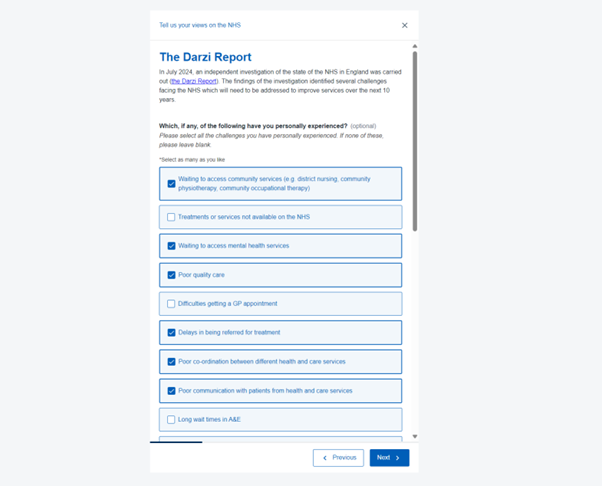
Step four: ‘the 3 shifts’
The next 3 questions focus on the ‘3 shifts’. These are the 3 main changes that the Government thinks must happen to improve the NHS. These are:
- Moving care from hospitals to the community
- Making better use of technology
- Focusing on prevention
It’s important that maternity care, saving babies lives’ and improving bereavement and mental health care for parents are a priority and are not forgotten in these ‘3 shifts’.
We’ll give you some suggested things you could say for each of the ‘3 shifts’. These sections are optional - so feel free to skip past them if you want to.

Shift 1: moving more care from hospitals to communities
The focus of this shift is about moving more NHS services into the communities and local areas where people live, instead of being fully focused on hospitals.
The first question is “In what ways, if any, do you think that delivering more care in the community could improve health and care?”
This could impact the way people give birth, and how bereavement care, and mental health support for bereaved parents, is provided.
For this, you could put:
- Maternity triage is an area of concern, with delays in admitting women and birthing people to hospital preventing them from receiving appropriate care. We believe that if you have any concerns at any stage of your pregnancy you should always be seen. The existing system creates confusion about when you should contact maternity services, and we know that this can lead to preventable deaths. As part of community care, women and birthing people must be provided with clear information on how and when to contact maternity services, and the response they should expect if they do.
- Bereavement care starts in the hospital but then continues into the community. Improving community mental health support to all families affected by pregnancy and baby loss could stop mental health problems developing and requiring more treatment.
- GPs should have the training to offer support to bereaved parents and refer those who require additional mental health support.
The second question asks “what, if anything, concerns you about the idea of delivering more care in the community in the future?”
This is hard to answer in relation to baby loss, but you could talk about services remaining safe if they are moved more to the community. Remember, this section is optional.
Shift 2: making better use of technology
This section focuses on how technology can be used to improve health and care services.
The first question asks, “in what ways, if any, do you think that technology could be used to improve health and care?”
We hear consistently from bereaved parents that NHS systems often don’t communicate properly, resulting in parents having to tell their story multiple times. It’s possible with better, more joined-up, systems throughout the NHS this could improve.
You could put:
- All digital records across the NHS must be able to talk with one another. Hospital systems must flag pregnancy and baby loss on all records which are seen by other medical professionals. This will help prevent women and birthing people having to repeat their experience multiple times to different organisations, which can be traumatic.
- NHS systems should ensure that, following a pregnancy or baby loss, relevant follow-up appointments are cancelled, and insensitive communications are not sent to bereaved parents. For example, emails asking bereaved parents about their newborn baby.
The second question asks, “what, if anything, concerns you about the idea of increased use of technology in the future?”.
Please feel free to add any of your personal concerns about increased use of technology in the NHS, otherwise feel free to skip this question.
Shift 3: focusing on preventing sickness
This shift focuses on preventing ill health to take the pressure off health and care services.
The first question asks, “in what ways, if any, could an increased focus on prevention help people stay healthy and independent for longer?”
1 in 5 baby deaths may have been preventable with better care. If the Government wants to focus on preventing poor health, they need to improve maternity services to prevent more babies dying and save lives.
More investment in mental health support for bereaved families could also prevent mental health problems getting worse and needing more treatment.
You could say:
- 1 in 5 baby deaths could have been prevented with better care. The Government must make maternity care a priority to save more babies’ lives. We can’t go on hearing about the same failings and scandals time after time. There needs to be proper systemic change to improve maternity and neonatal services.
- A better focus on the early identification of high-risk pregnancies, and personalised care provided to all pregnant women and birthing people, could help save more babies’ lives.
- Improved triaging systems within maternity services could help ensure women and birthing people know when they need to call for help. It could also make sure they are given the right advice and seen timely when there is a concern for their, or their baby's, wellbeing.
- More investment in mental health support for bereaved parents following pregnancy or baby loss could prevent moderate mental health problems getting worse.
The second question asks, “what, if anything, concerns you about the idea of an increased focus on prevention in the future?”. This bit is optional, so feel free to skip it.
Step five: your satisfaction with the NHS, and about you
You’re nearly there! The next few pages are just a few multiple-choice questions about your overall satisfaction with the NHS, and which services you have used in the past 12 months.
You’ll be asked to give a few bits of information about yourself and then you can submit your answers.
After you finish this, you should see a message that confirms your response has been received.

If you’ve gotten this far, a huge well done.
By feeding in your views, and advocating for change, you have helped raise saving babies’ lives and improving bereavement care up the government’s priority list for the NHS. Thank you!
And that’s it!
Thank you so much for taking the time to get involved with the NHS consultation. Together, we are calling for systemic change to improve services, save more babies’ lives and improve care for every bereaved parent.
We have now submitted our response to the consultation, you can read a summary of our answers here.
Keep an eye on our campaigning pages for other ways you can get involved and stay up to date.
If you have any questions about campaigning with Sands, please don’t hesitate to drop us a line at campaigns@sands.org.uk
